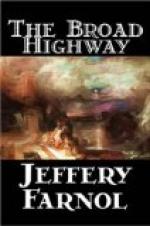It was a quaint air, with a shake at the end of the first two and last two lines, which, altogether, I thought very pleasing. I advanced, guided by the voice, until I came out into a grassy lane. Seated upon an artfully-contrived folding stool, was a man. He was a very small man despite his great voice, who held a kettle between his knees, and a light hammer in his hand, while a little to one side of him there blazed a crackling fire of twigs upon which a hissing frying-pan was balanced. But what chiefly drew and held my attention was the man’s face; narrow and peaked, with little, round, twinkling eyes set deep in his head, close black hair, grizzled at the temples, and a long, blue chin.
And presently, as I stood staring at him, he finished his song, and chancing to raise his eyes stared back at me.
“Good morning!” said he at last, with a bright nod.
“So then you didn’t cut your throat in the Hollow Oak, after all?” said I.
“Nor likely to either, master,” he answered, shaking his head. “Lord love your eyes and limbs, no!”
“But,” said I, “some day or so ago I met a man—”
“Ah!” nodded the Tinker, “to be sure you did.”
“A pedler of brooms, and ribands—”
“‘Gabbing’ Dick!” nodded the Tinker.
“Who told me very seriously—”
“That I’d been found in the big holler oak wi’ my throat cut,” nodded the Tinker.
“But what did he mean by it?”
“Why, y’ see,” explained the Tinker, leaning over to turn a frizzling bacon-rasher very dexterously with the blade of a jack-knife, “y’ see, ‘Gabbing’ Dick is oncommon fond of murders, hangings, sooicides, and such like—it’s just a way he’s got.”
“A very unpleasant way!” said I.
“But very harmless when all’s done and said,” added the Tinker.
“You mean?”
“A leetle weak up here,” explained the Tinker, tapping his forehead with the handle of the jack-knife. “His father was murdered the day afore he were born, d’ye see, which druv his poor mother out of her mind, which conditions is apt to make a man a leetle strange.”
“Poor fellow!” said I, while the Tinker began his tap-tapping again.
“Are you hungry?” he inquired suddenly, glancing up at me with his hammer poised.
“Very hungry!” said I. Hereupon he set down his hammer, and, turning to a pack at his side, proceeded to extract therefrom a loaf of bread, a small tin of butter, and a piece of bacon, from which last he cut sundry slices with the jack-knife. He now lifted the hissing rashers from the pan to a tin plate, which he set upon the grass at my feet, together with the bread and the butter; and, having produced a somewhat battered knife and fork, handed them to me with another bright nod.
“You are very kind!” said I.
“Why, I’m a man as is fond o’ company, y’ see—especially of one who can think, and talk, and you have the face of both. I am—as you might say—a literary cove, being fond o’ books, nov-els, and such like.” And in a little while, the bacon being done to his liking, we sat down together, and began to eat.




